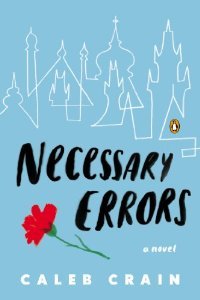Jacob Putnam is a sensitive young Harvard graduate burdened with literary aspirations. Having quit an advertising job in pursuit of artistic freedom, he’s traveled to Prague and become the archetypal innocent abroad.
The title of Caleb Crain’s debut novel, “Necessary Errors,” tells you plenty about what’s in store for Jacob as he and his expatriate friends navigate the economics of ambition, love and idealism against the backdrop of a country on the cusp of wrenching fiscal and social change.
The book opens in October 1990. The Velvet Revolution is less than a year old and socialism remains deeply ingrained. “The Wild East,” Jacob discovers, is every bit as foreign as Western Europe was to the travelers Henry James and Edith Wharton conjured up.
There is still no real private market for apartments, so he takes rooms in a family home, paying rent to be a guest. In a pub, he chats with men who cannot grasp that from now on, white-collar workers will automatically earn more than those who work with their hands.
And then there is breakfast: pastries a lot like croissants except that they’re straight, their curve having been deemed too frivolous under the old system.
While the Czechs try to fathom the mechanics of capitalism, Jacob must come to terms with his own personal liberation: Shortly before leaving America, he came out as gay and had his heart broken by his first boyfriend.
The friends he makes in Prague hail from Britain, Ireland and Germany, as well as from back home. There’s glamorous Melinda and her serious boyfriend Rafe, sharp-tongued Annie and mournful Kaspar, beautiful Thom and childlike Carl.
He meets them through the language school where he teaches English; together they get drunk on Czech beer and have angst- ridden conversations about philosophy and art. So far as love goes, none of them seems particularly successful. As Jacob says, “It sometimes felt as if, in compensation, they were all falling in love with one another, as a group.”
Crain has a sharp ear for dialogue, meticulously capturing verbal tics like the “Ehm”s that characterize Annie’s brogue. When Jacob speaks Czech – ordering at a bar, for instance – Crain makes sure that the English translation reflects the strangeness of life lived partly in a foreign tongue: “I’m giving myself a soda water.”
For all their talk about life’s big questions, simply being in Prague frees these 20-somethings from getting on with their lives. As Jacob notes, being abroad becomes an end in itself: “Being here is what you’re doing, when you’re here.”
Not that there is anything romantic about Crain’s Prague, a city where every meal seems to feature dumplings and steamed cabbage and whose ceaselessly gray sky is just another of its “weapons.”
The locals aren’t exactly charming, either. At the gay club listed in Jacob’s tourist guide, the bouncer sometimes lets him in, sometimes doesn’t. It’s a mystery until one of the regulars explains: “He is an old Communist. He only understands money.”
As the novel unfolds, money becomes a versatile metaphor. Though Jacob feels as if he’s learning in Prague, he worries that his newfound wisdom applies only to life there. “It was as if he held a large sum in a currency that could only be exchanged at a steep discount,” Crain writes.
More literally, Jacob learns that a mysterious older man he’s begun a relationship with has already embraced capitalism in ways that shock him.
Having been too precious about his writing to work an office job in the U.S., Jacob finds that in Prague, his writing time is consumed by everyday chores, like doing laundry, which become Kafkaesque challenges.
In keeping with the ambiguity that defines this smart, pensive novel, the reader is left wondering just which was the real error: going to Prague in the first place or returning to life among the strivers he fled.
Send questions/comments to the editors.



Comments are no longer available on this story